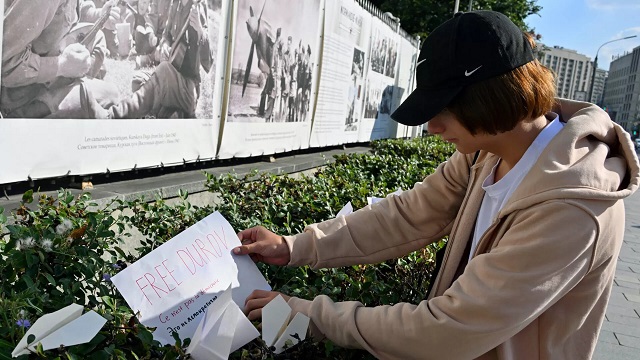Censorship Industrial Complex
Telegram CEO Pavel Durov’s Arrest Is Part of a Global War on Free Speech

From The Rattler
Governments around the world seek to suppress ideas and control communications channels
It’s appropriate that, days after the French government arrested Pavel Durov, CEO of the encrypted messaging app Telegram, for failing to monitor and restrict communications as demanded by officials in Paris, Meta CEO Mark Zuckerberg confirmed that his company, which owns Facebook, was subjected to censorship pressures by U.S. officials. Durov’s arrest, then, stands as less of a one-off than as part of a concerted effort by governments, including those of nominally free countries, to control speech.
“Telegram chief executive Pavel Durov is expected to appear in court Sunday after being arrested by French police at an airport near Paris for alleged offences related to his popular messaging app,” reported France24.
A separate story noted claims by Paris prosecutors that he was detained for “running an online platform that allows illicit transactions, child pornography, drug trafficking and fraud, as well as the refusal to communicate information to authorities, money laundering and providing cryptographic services to criminals.”
Freedom for Everybody or for Nobody
Durov’s alleged crime is offering encrypted communications services to everybody, including those who engage in illegality or just anger the powers that be. But secure communications are a feature, not a bug, for most people who live in a world in which “global freedom declined for the 18th consecutive year in 2023,” according to Freedom House. Fighting authoritarian regimes requires means of exchanging information that are resistant to penetration by various repressive police agencies.
“Telegram, and other encrypted messaging services, are crucial for those intending to organize protests in countries where there is a severe crackdown on free speech. Myanmar, Belarus and Hong Kong have all seen people relying on the services,” Index on Censorship noted in 2021.
And if bad people occasionally use encrypted apps such as Telegram, they use phones and postal services, too. The qualities that make communications systems useful to those battling authoritarianism are also helpful to those with less benign intentions. There’s no way to offer security to one group without offering it to everybody.
Durov’s Second Clash With an Authoritarian Government
A CNN report on the case (I watch so you don’t have to) weirdly linked Durov to Russian President Vladimir Putin, insinuating the two are conspiring. But as Reuters helpfully points out, “Telegram, based in Dubai, was founded by Durov, who left Russia in 2014 after he refused to comply with demands to shut down opposition communities on his VK social media platform, which he has sold.”
The Internet Archive contains links to 2014 posts by Durov boasting, in Russian, that he refused to surrender information about Ukrainian users of VKontakte to the Putin regime and balked at barring the late Alexei Navalny’s opposition group from the service.
“I’m afraid there is no going back,” Durov told TechCrunch after leaving Russia to build Telegram. “Not after I publicly refused to cooperate with the authorities. They can’t stand me.”
Telegram was initially blocked in Russia, but the ban was unpopular and unsuccessful, and soon dropped. The service is now widely used by both Russians and Ukrainians as a digital battleground in their war.
Given that Telegram was founded by a free speech champion who fled his home country after refusing to monitor and censor speech for the authorities, it’s very easy to suspect that Pavel Durov has run afoul of authoritarians operating under a different flag, no matter the protestations of French President Emmanuel Macron that the arrest “is in no way a political decision” and that France “is deeply committed to freedom of expression and communication.”
This is the same Macron, after all, who last year, after riots he insisted were coordinated online, huffed “We have to think about the social networks, about the bans we’ll have to put in place. When things get out of control, we might need to be able to regulate or cut them off.”
More recently, free speech groups objected to European Union threats to censor political content on X—specifically, an interview with Republican presidential candidate Donald Trump.
The U.S. Has Its Own Free Speech Concerns
Matters are better in the United States, but not so much (as we have every right to demand). The Twitter Files and the Facebook Files revealed serious pressure brought to bear by the U.S. government on social media companies to stifle dissenting views and inconvenient (to the political class) news stories. If any further confirmation was needed, Zuckerberg sent a letter to the House Judiciary Committee on August 26 regretting the company’s role in succumbing to pressure to censor content.
“In 2021, senior officials from the Biden administration, including the White House, repeatedly pressured our teams for months to censor certain COVID-19 content, including humor and satire,” Zuckerberg wrote to Chairman Jim Jordan (R–Ohio). “I believe the government pressure was wrong, and I regret that we were not more outspoken about it.”
Zuckerberg also admitted to suppressing reports about the incriminating contents of Hunter Biden’s laptop at the FBI’s behest. “We’re ready to push back if something like this happens again,” he promised.
Fighting a Free Speech Recession
Durov’s arrest isn’t an isolated incident. It comes amid what Jacob Mchangama, (founder of the Danish think tank Justitia and executive director of The Future of Free Speech) calls “a free speech recession.” He warns that “liberal democracies, rather than constituting a counterweight to the authoritarian onslaught, are themselves contributing to the free-speech recession.”
“Recession” might be too soft a word to describe a phenomenon that has governments attempting to suppress ideas and arresting entrepreneurs who operate neutral communications channels. These are harsh policies with real costs in terms of human freedom.
Telegram didn’t respond to a request for comment, but in a public statement said, “it is absurd to claim that a platform or its owner are responsible for abuse of that platform.”
In a post from March, Pavel Durov himself commented, “All large social media apps are easy targets for criticism due to the content they host.” He vowed, “we shall solve any potential challenges the same way we do everything else — with efficiency, innovation and respect for privacy and freedom of speech.”
Durov’s arrest shows that he, like all champions of free expression, must wage their battles for liberty against the active opposition of government officials even in nominally free countries. Free speech is as important as ever, but more besieged than it has been in a long time.
Here are a few more good articles about liberty:
|
|
|
|
Alberta
Alberta bill would protect freedom of expression for doctors, nurses, other professionals

From LifeSiteNews
‘Peterson’s law,’ named for Canadian psychologist Jordan Peterson, was introduced by Alberta Premier Danielle Smith.
Alberta’s Conservative government introduced a new law that will set “clear expectations” for professional regulatory bodies to respect freedom of speech on social media and online for doctors, nurses, engineers, and other professionals.
The new law, named “Peterson’s law” after Canadian psychologist Jordan Peterson, who was canceled by his regulatory body, was introduced Thursday by Alberta Premier Danielle Smith.
“Professionals should never fear losing their license or career because of a social media post, an interview, or a personal opinion expressed on their own time,” Smith said in a press release sent to media and LifeSiteNews.
“Alberta’s government is restoring fairness and neutrality so regulators focus on competence and ethics, not policing beliefs. Every Albertan has the right to speak freely without ideological enforcement or intimidation, and this legislation makes that protection real.”
The law, known as Bill 13, the Regulated Professions Neutrality Act, will “set clear expectations for professional regulatory bodies to ensure professionals’ right to free expression is protected.”
According to the government, the new law will “Limit professional regulatory bodies from disciplining professionals for expressive off-duty conduct, except in specific circumstances such as threats of physical violence or a criminal conviction.”
It will also restrict mandatory training “unrelated to competence or ethics, such as diversity, equity, and inclusion training.”
Bill 13, once it becomes law, which is all but guaranteed as Smith’s United Conservative Party (UCP) holds a majority, will also “create principles of neutrality that prohibit professional regulatory bodies from assigning value, blame or different treatment to individuals based on personally held views or political beliefs.”
As reported by LifeSiteNews, Peterson has been embattled with the College of Psychologists of Ontario (CPO) after it mandated he undergo social media “training” to keep his license following posts he made on X, formerly Twitter, criticizing Trudeau and LGBT activists.
He recently noted how the CPO offered him a deal to “be bought,” in which the legal fees owed to them after losing his court challenge could be waived but only if he agreed to quit his job as a psychologist.
Early this year, LifeSiteNews reported that the CPO had selected Peterson’s “re-education coach” for having publicly opposed the LGBT agenda.
The Alberta government directly referenced Peterson’s (who is from Alberta originally) plight with the CPO, noting “the disciplinary proceedings against Dr. Jordan Peterson by the College of Psychologists of Ontario, demonstrate how regulatory bodies can extend their reach into personal expression rather than professional competence.”
“Similar cases involving nurses, engineers and other professionals revealed a growing pattern: individuals facing investigations, penalties or compulsory ideological training for off-duty expressive conduct. These incidents became a catalyst, confirming the need for clear legislative boundaries that protect free expression while preserving professional standards.”
Alberta Minister of Justice and Attorney General Mickey Amery said regarding Bill 13 that the new law makes that protection of professionals “real and holds professional regulatory bodies to a clear standard.”
Last year, Peterson formally announced his departure from Canada in favor of moving to the United States, saying his birth nation has become a “totalitarian hell hole.”
Censorship Industrial Complex
Move over Soviet Russia: UK Police Make 10,000 Arrests Over “Offensive” Online Speech

In a nation where 90 percent of crimes go unsolved, the real emergency seems to be someone being offensive online.
|
|
-

 Business18 hours ago
Business18 hours agoNew airline compensation rules could threaten regional travel and push up ticket prices
-

 Health2 days ago
Health2 days agoCDC’s Autism Reversal: Inside the Collapse of a 25‑Year Public Health Narrative
-

 Daily Caller2 days ago
Daily Caller2 days agoBREAKING: Globalist Climate Conference Bursts Into Flames
-

 Digital ID1 day ago
Digital ID1 day agoLeslyn Lewis urges fellow MPs to oppose Liberal push for mandatory digital IDs
-

 Crime2 days ago
Crime2 days agoCocaine, Manhunts, and Murder: Canadian Cartel Kingpin Prosecuted In US
-

 Energy2 days ago
Energy2 days agoHere’s what they don’t tell you about BC’s tanker ban
-

 Bruce Dowbiggin2 days ago
Bruce Dowbiggin2 days agoBurying Poilievre Is Job One In Carney’s Ottawa
-

 COVID-192 days ago
COVID-192 days agoCovid Cover-Ups: Excess Deaths, Vaccine Harms, and Coordinated Censorship












